

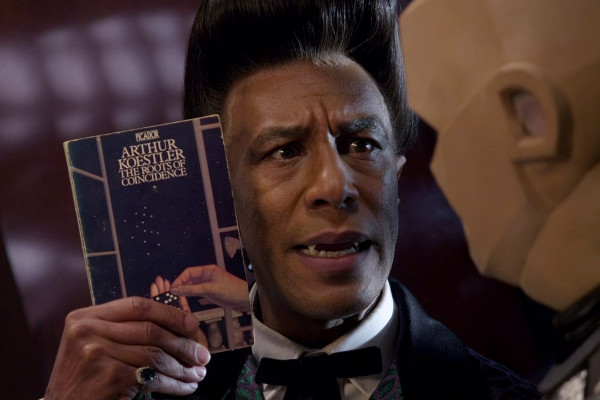
One of the positives of the Dave episodes has been that, now Craig Charles' and Chris Barries' working relationship is on much better terms than it was c. 1989-1993, the Lister-Rimmer relationship has been restored to the central focus of the series. Kryten and the Cat were only ever backdrops/support to the shows' central premise, but behind-the-scenes conflicts forced the creation of the unlikely "Red Dwarf Posse." Lister's baiting of Rimmer in the opening scene is amusing, though surely Lister wouldn't be so cruel as to mock Rimmer for wiping out the crew? It's an example of the characterisation taking a back seat to jokes, something symptomatic of the show from 1992 on.
Speaking of Kryten and the Cat, then they become "quantum entangled", which lends the episode its title. What this basically entails is the two of them saying the same lines simultaneously, which is a curious thing to pass as comedy for a viewership older than a Crackerjack audience. One particularly notable thing is that John-Jules, once a highlight of many episodes, now seems to have forgotten how to play the role in full, delivering every single line in the Cat's higher register, rather than just the occasional one. It does make it a more wearing character than before, not helped by his wig being even more distracting than Kryten's mask.
Kochanski gets referenced for the third time in series 10, and a point of trivia is that she's stated as being 31. Five years later (M-Corp) Lister would reveal himself to have reached his 50th birthday, so those who feel uncomfortable with a 15+ age gap may get dismayed here. (It's worth noting that this is also a creation of the series only: Charles is a couple of years younger than original Kochanski Clare Grogan, and the replacement version, referred to here, was played by a Chloë Annett who is only seven years younger).
The resolution to a fairly rewarding (albeit convoluted) plot sees the crew bringing on board a professor who has been turned into a chimpanzee. As regulations regarding the time an actor can spend playing a chimp dictated that they couldn't do this for long (yes, really) a new ending had to be hastily rewritten with an underwhelming Sydney Stevenson as a professor who always gets everything wrong. That her name turns out to spell irony (of sorts) is ludicrous, and the "whatever I say, it's the opposite, because I'm always wrong" plot development is, once again, pure Crackerjack stuff. These scenes with Sydney Stevenson do seem "off" in atmosphere, though this is probably due to them being filmed without a studio audience as they were late rewrites.
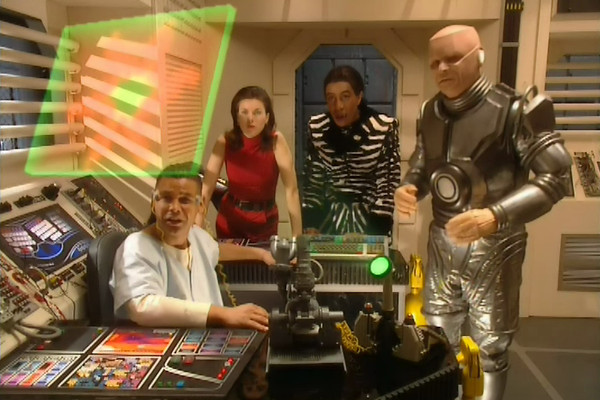
Written by Paul Alexander and Doug Naylor, Epideme indulges in more of the "Lister kissing" humour that became a trend for Red Dwarf at the time, following on from him swapping saliva with a Psiren and Rimmer over the last few episodes. It's a very cheap, crowd-pleasing attempt at humour, as is the US-courting "deader than a Saturday night in Salt Lake City" which audibly gets no laughs from the UK audience.
What's notable in series seven is how out-of-character Kryten and Lister became in order to artificially generate some form of "humour". Lister was always the "cool" one of the group, mainly, his bad habits a supposedly likeable counterpoint to Rimmer's uptight nature, rather than being a simple "bozo" who does constantly buffoonish things in the name of komedy. Meanwhile, Llewellyn himelf admitted that the needy, bitter Kryten of series seven deserved "a good slap".
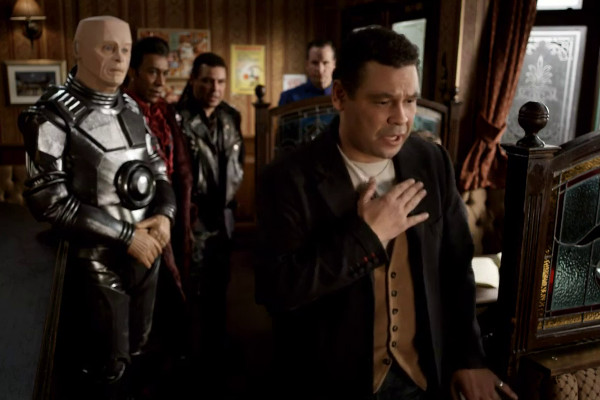
Back To Earth was shot from 31st January-8th March 2009, and inevitably a scene where the cast meet themselves has them encountering Craig Charles on the Coronation Street set. Had it been made six years earlier then they would, perhaps, had the budget reached to it, have met Chris Barrie on the set of one of the Tomb Raider movies. It's curious to imagine what the cast thought of Charles's stardom elsewhere being so heavily featured, though it's to his credit he was prepared to go along with mocking himself so savagely ("I've gotta get back to the Priory!")
It's debatable what the crossover is between Red Dwarf fans and Coronation Street viewers, seemingly a very small Venn Diagram result, but Simon Gregson does, sadly, have more chemistry with Charles at this stage, despite continually using a biro as a prop. While Coronation Street generated the majority of the special's publicity, it's a Blade Runner homage-cum-parody that takes up the bulk of the episode. While perhaps ill-advised, there is a certain poignancy in the crew wanting to live again, and not cease to exist.
Acting as a sequel to Back To Reality, the episode once again shows Naylor's lack of fresh ideas, though there's a nice cameo for Chloë Annett as a hallucination of Kochanski. The search for Kochanski was eventually going to inform series ten, and she was referenced in four of the episodes. However, budget restraints caused this not to happen, and this is, to date, the last appearance of the character in the series.
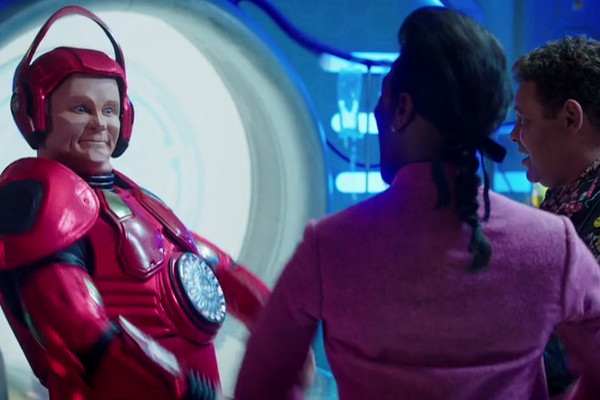
Almost the best episode of series 11, where the jarring "one liner per second" format is dropped in favour of the character-based comedy that the series is so much better at. This said, it's still not averse to the crowd-pleasing "wacky costume" humour, as evidenced every week in the series's painful "opening clips" sequence, and in the image above. Yet there's a more thoughtful story at work here. With Kryten having a mid-life crisis and meeting a superior mechanoid, his insecurities come to the fore, and Rimmer shows his typical lack of compassion.
Lesser episodes would have considered this enough to fill out the duration, but inspiration manages to hit further when the crew of the Dwarf get to speak to the entire universe. Earlier, more cynical Red Dwarf episodes would have left the universe with the mid-life crisis that meeting the Red Dwarf crew gave it, but even though the universe is helped back with an unusually American platitude, there's still more bitterness from Kryten to come...
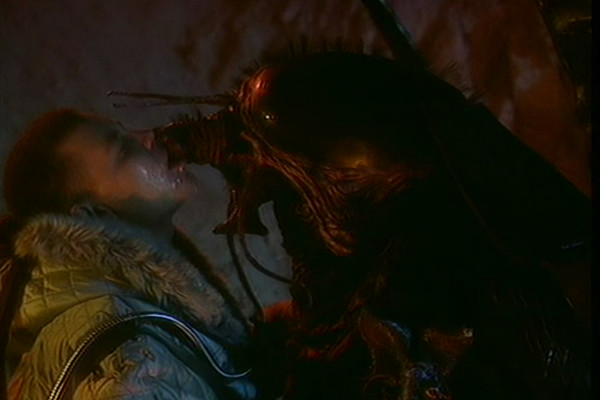
There's a definite dividing line between "proper" Red Dwarf and the later, weaker attempts at the format, and so it does feel almost sacrilegious to start including Grant-Naylor episodes in amongst the rest, even though we're nearly at the Top 40. Stories abound that Doug Naylor didn't even know much about science fiction before Rob Grant filled him in, and so Doug wasn't the ideal person to continue the series after Rob decided he wanted to go his separate way. Yet Rob Grant is perhaps flattered by the situation, in that a clear downward trend can be seen during Grant's final series anyway.
Series six is ambitious in that it attempts to tell a more serialised narrative, the kind of thing not seriously attempted since series one. However, it does see the programme sadly descend into a more Americanised, gag-per-minute format, which makes it a very different show to what came before. Such a change in the dynamic is criticised by Craig Charles on the commentary to Thanks For The Memory, where he misremembers it as coming earlier, with
"[series] four and five became kind of traditional sitcoms, there was always a Kryten gag about the shape of his head, there was always a Space Corps directive, it became sort of formulaic."
Series six has a running theme of Red Dwarf being stolen and the crew trapped on Starbug. Perhaps as a result Cat's character is expanded, as there's nowhere for the character to exit in such a confined space. This does raise concerns in that the character is now given an enhanced sense of smell, something which arguably contradicts what came before. If nothing else, it allows for one of the series' weakest jokes, with a lame "Cat, are you getting any scent from that meteorite?" "I didn't even know they had a duty free shop."
The script to Psirens was released as part of a script book before it was televised, and so the lack of real humour could be gleaned several months before broadcast. Rimmer's line about "bigger than King Kong's first dump of the day" is indicative of a series that now trades in similes and one-liners at the expense of characterisation. There's also a guitar scene which never really takes off - Lister as bad guitarist is okay for the odd joke, but as the climactic element of an episode, it's lacking. Consequently this limited "gag" has been worn into the ground in the post-Grant years, a desperate fall back for Doug Naylor.
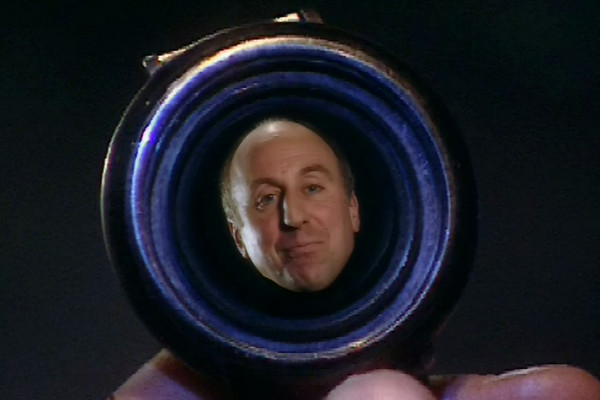
Distasteful humour is enjoyed here at The Anorak Zone when done well, so references to disliking it in Red Dwarf are not necessarily the result of PC thinking or a Guardian-style editorial... it's just that Red Dwarf simply isn't that kind of show. It's not being "politically correct" to point out that a sitcom listing how people with missing limbs have never amounted to much is in bad taste. What would have worked in the 70s was deeply old-hat and offensive by 1997, though it's perhaps somewhat tempered by the knowledge that Doug Naylor himself has an artificial leg, and so is effectively taking the piss out of himself.
Nanarchy also has the distinction of containing arguably the worst-ever joke in the entire series, with Doug's desperate "simile" humour plummeting to new lows with "there must be more electricity out there than the surge that went through the national grid during the commercial break in the Olympic all-girl custard wrestling finals." That Danny John-Jules manages to say the entire line without a pause for breath is to his credit.
The big event of Nanarchy is, of course, the resurrection of Red Dwarf and Holly. A suitably wacky plot device sees the ship existing microscopically in Lister's laundry basket due to Kryten's rogue nanobots, which is unbelievable but pleasingly zany, especially when passed off by Norman Lovett as "the oldest trick in the book". Having Holly reset to "default" Lovett mode is pleasing, albeit somewhat of a slight to Hattie Hayridge. Hayridge wasn't the greatest actress in the series, and her rapport with the crew was never the same as that of Lovett's, but her role was made increasingly redundant due to Kryten's growing prominence, and she never had the opportunities in the scripts that Lovett had during series two.
Actorly slights aside, the sight of Lovett returning to the series lent hope that the glory days of the series could be resurrected along with the ship... sadly, series eight gave Lovett nothing to do, and, on the occasions where he did have jokes, they were terrible. Norman was vocal on the commentaries about how poor he thought the humour was, though wasn't without blame for some of the weaker jokes... series eight opened with a "sickbags on standby" gag, which was his own suggestion. Such developments should have been obvious here, where not only is Lovett's timing not as sharp with the passing of time, but he opens up with a "can't pronounce a word" routine like Bodger and Badger never ended. To his credit, Lovett also criticised his own performance, believing "I've lost it, I've just lost it... it's all gone." Nanarchy was a reasonable series finale, yet rather than being the introduction to a great new era, led into an all-time low.

While series three had its weaker moments, Camille is the first genuinely below-par episode of Red Dwarf. Beginning with an inexplicably unamusing "Kryten is taught to lie" sequence (following on from The Last Day, where he lied twice), it features a love story with a giant green blob that's all a bit Galloping Galaxies. It would be unfair to criticise stand-up comedienne Judy Pascoe as the main guest star, as she's now Robert Llewellyn's wife, but she lacks the onscreen drive to really make the part work. Although most of the cast are comedians-turned-actors, they're able to make such limitations work in a way that's rare, and can't always be repeated.
Yet it's not all that bad, and Kryten's remark about how many of his crewmates are likeable ("some of them... well, one of them.... maybe...") is so good that Doug Naylor has shamelessly reworked it for some Dave episodes. A Tales of the Riverbank discussion between Lister and the Cat is clearly a self-conscious attempt to revisit the Flintstones routine from Backwards, and, along with a Karl Malden reference, betrays the fact that Grant-Naylor were significantly older than the show's target audience. (Craig Charles admits on the commentary that it was a direct attempt to recreate the Flintstones routine and that it "didn't quite get up there").
Although the title sequence to series six gives away nearly all of the (many) jokes that aren't based around Cat sayings or Space Corp directives, there's no worse choice of clip introduction than giving away the Cat's choice of ideal partner. Camille was recorded fourth and was scheduled to be broadcast third, but, due to the romantic element and Meltdown's anti-war theme, was brought forward to launch the series on its Valentine's Day broadcast.
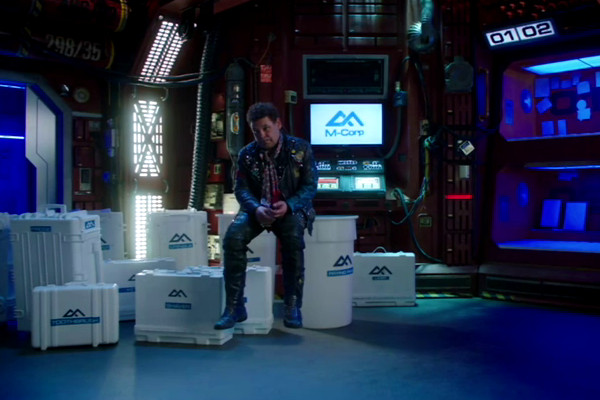
There is the feeling that, although the show was starting to get tired as early as 1993, the end of the Grant-Naylor partnership saw the real end of the series. Everything from series seven has been, while not without its moments, lacking in the same originality, vitality, and... well... jokes. This is not to say that a series written entirely by Rob Grant would have necessarily been better (we're unlikely to ever know), but Doug Naylor has struggled to keep the show afloat by himself.
There have been 37 episodes of Red Dwarf since Rob Grant left the series, exactly one more than when he co-wrote it. Although Doug tried getting co-writers on board for seven of the episodes, generally he has written it by himself ever since, including all of the Dave episodes, which he also directed. It's a series that requires constant ambition and ideas, and so retreads of previous plots and call backs to jokes 28 years old don't really cut it.
In fairness to Doug, then a glance at Rob's last credit for television back in 2000 - the SF "comedy" The Strangerers - also flags up a lack of real direction. Maybe Grant-Naylor really only worked as the gestalt entity they always claimed to be, and couldn't duplicate their success outside of their partnership? Although they have expressed that they were pulling in different directions, maybe this creative conflict was needed to make the show as good as it was back in the first five seriess?
Thankfully, M-Corp recalls a time when the series still had some sense of purpose in its depiction of purposelessness. Here Lister is revealed to have reached his 50th birthday, and reflects on how he's going nowhere, and has nothing to live for. This isn't quite series one or Timeslides depression, but it's a nice touch that the series is still interested in exploring this kind of material in among the repetitive "Cat hates Rimmer/Rimmer tells Cat he's stupid" one-liners. Things get even better when a genuinely innovative plot sees a new multi-national corporation take over Red Dwarf, making it impossible for Lister to see anything that doesn't belong to M-Corp. The Dave Channel episodes have seen Red Dwarf get subverted from "the last man alive" and into the most populated universe Red Dwarf has ever encountered, making Lister more of a straight loser than a tragic romantic hero, but this is still a clever plot, well delivered.
Things take an even darker turn when Lister can't see his friends, and must face total isolation. Sadly, this is also where the episode parts company with something containing a bit more substance. Rather than having Lister resolve things for himself in an innovative solo outing, it turns into some knockabout comedy with a bad plot resolution where "M-Corp" is revealed to be evil, and there's a late plot development relating to Lister's age that gets spoilered in the opening credits of every episode of the series.
One big problem with the Dave episodes is that Charles seems unable to really capture the Lister character any more, yet this is put somewhat to rest here, as not only is it one of his better performances of late, but he's also able to recreate the personality of his series one self in the closing moments. This quoting of lines from The End (did Rob get a fee?) causes the fifth burst of applause from the amped-up audience, an example of the series broadcasting to a minority.
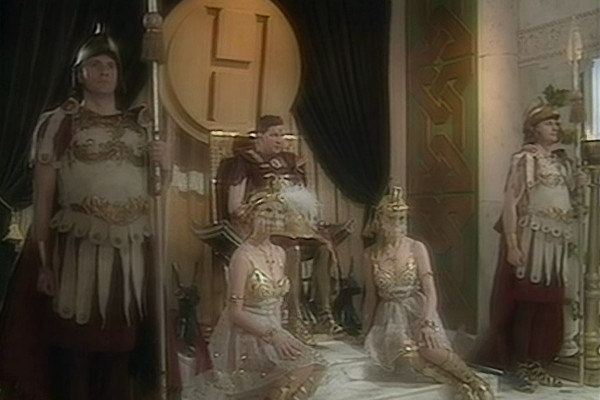
While having the crew facing regular dangers is a nice dramatic idea, it does throw the "last human being alive" motif of the series into sharp focus when they suddenly occupy one of the most crowded areas of space ever seen. Psirens has Lister awake from 200 years of suspended animation, which perhaps goes to explain how the various GELFs and Simulants have managed to multiply in the interim, and consequently justifies the differing world of the Dave episodes.
By this stage in the series there is a definite sense that the programme is taking itself too seriously. Rimmerworld featured some of the same sets and an actress as Gunmen of the Apocalypse, and so was consequently filmed back-to-back. Rather anally, a line is given to the Cat to explain how he had the same outfit when they met the Simulants before.
Beyond the Simulants, it's very much a Rimmer episode, as he lands on a planet cloned by himself. Following on from just the previous series's Terrorform, it does feel like familiar ground and, while there are some decent jokes, there's nothing really outstanding in a likeable but very forgettable instalment.
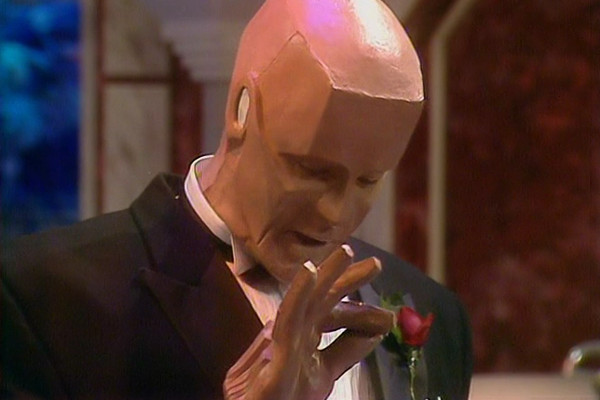
The Last Day is the first Robert Llewellyn episode to really focus on Kryten, a situation that would change over the following series, with the character becoming increasingly central to the plots. Series three is the oddest run for the character, as he's on board the ship without a real introduction, and the Americanised humour and Llewellyn's uncertain, off-kilter playing makes it something of a bad fit. Thankfully the character's humour would become a little more in tune with the general humour of the series, though could still feel intrusive. Possibly it's also that the voice isn't quite there yet, and the mask is hugely different to what followed, being even more off-beat than the "Bo Selecta" mask of series 10.
Llewellyn was, to be fair, always a good performer, even if the material wasn't up to scratch. Yet there are notable moments where he struggles with all the exposition he was saddled with, and here, where he receives a birthday gift of a computer chip, he's very obviously reading the description off a cue card. The generally misguided Remastered version does improve on this by splicing in a Rimmer reaction shot to mask this somewhat, though to his credit Llewellyn always mocks his cue card reading on the commentary tracks.
With these rankings, it often comes down to the fact that comedy is subjective, and so this may be a favourite for many. The idea of a calculator having a spiritual afterlife can either be surrealy hilarious or just plain silly, depending on taste. Personally the concept of Kryten being embarrassed about the middle letters in his name feels very much like a non-joke, though others may be amused. Perhaps more galling is that Lister, an atheist, is given a religious belief just to service the "jokes". Better are the tales of Rimmer as a Samaritan and the story of his uncle Frank, but they're small moments in a generally skippable instalment.